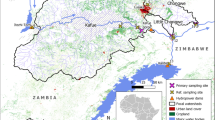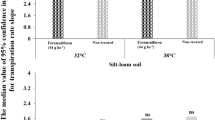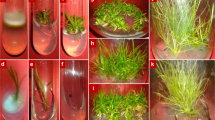Abstract
IT is clear that the problem of excessive vegetation in many lakes, canals and streams in developed countries must be solved if these bodies of water are to continue to be used economically for transportation, recreation and drainage. Submerged weeds such as Florida elodea (Hydrillia verticillata)1,2 are particularly troublesome because the plant is perennial and usually firmly anchored to the bottom by long adventitious roots; further, it forms dense mats which may clog the top foot of water, and can spread over the water by four different methods.
This is a preview of subscription content, access via your institution
Access options
Subscribe to this journal
Receive 51 print issues and online access
$199.00 per year
only $3.90 per issue
Buy this article
- Purchase on Springer Link
- Instant access to full article PDF
Prices may be subject to local taxes which are calculated during checkout
Similar content being viewed by others
References
MacKenzie, J. W., and Hall, L., Hyacinth Control. J., 6, 37 (1969).
Holm, L. G., Weldon, L. W., and Blackburn, R. D., Science, 166, 699 (1969).
Little, E. S. C., Weed Res., 8, 79 (1968).
Cross, D. G., J. Fish Biol., 1, 27 (1969).
Author information
Authors and Affiliations
Rights and permissions
About this article
Cite this article
MARTIN, D., DOIG, M. & MILLARD, D. Potential Control of Florida Elodea by Ion-control Agents. Nature 226, 181–182 (1970). https://doi.org/10.1038/226181a0
Received:
Revised:
Issue Date:
DOI: https://doi.org/10.1038/226181a0
Comments
By submitting a comment you agree to abide by our Terms and Community Guidelines. If you find something abusive or that does not comply with our terms or guidelines please flag it as inappropriate.



